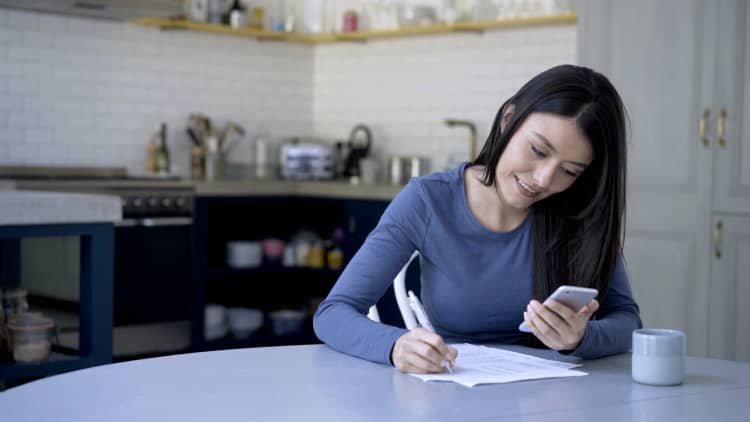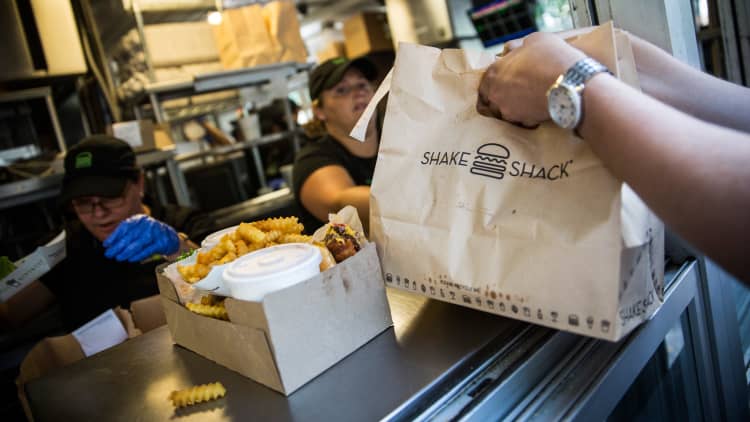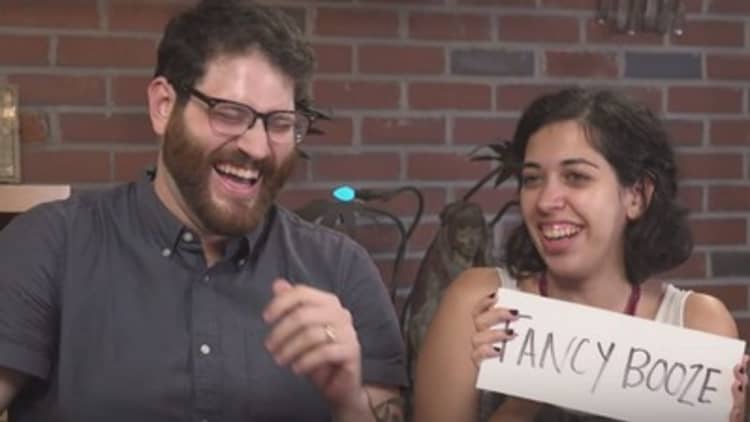Gaby Dunn can't listen to her own podcast — at least not the early episodes. "I'm really embarrassed about things that I said," she admits, particularly the details she revealed about her bank balance and conversations she'd had with her student-loan servicer.
But that's exactly what makes "Bad With Money With Gaby Dunn" so fresh. Dunn is candid and funny. She's not a personal-finance expert and doesn't pretend to be. Instead, she's just another "deadbeat," as she jokingly puts it, trying to get her financial life in order.
As Dunn tells it, the idea for the show grew precisely out of her lack of financial knowledge. In talks with Panoply to do a podcast, she told the network, "I have no idea how to do anything [with money] and it's the biggest stressor in my life and I keep it a secret from everyone. And they were like, 'Let's do a show about that!' And I said, 'Yeah, sure.'"
Now "Bad With Money" is in its third season, having racked up fans and accolades along the way, and Dunn is writing a book based on the show, due out next year. That's just one of her many projects.

Her YA novel, "I Hate Everyone But You," co-written with comedy partner Allison Raskin and published in 2017, made The New York Times bestseller list. Dunn is also a YouTube personality who runs a lively channel with Raskin called "Just Between Us," and a working actress who played a recurring character on the Starz show "Take My Wife." She writes TV scripts, too. Dunn has sold four pilots to date — to YouTube Red, Fox, MTV and FX — and currently works for Netflix's "Big Mouth."
"And I still work like an insane person," she says.
The kicker? Dunn is only 29.
The secret of her prolific output is simple, she says: "It doesn't have to be perfect, it just has to be done." Dunn says she aims to finish whatever she takes on, and at the same time is careful not to "be precious" about any one idea.
"I moved from journalism being my primary thing, to working in television, to being on camera, to acting," she says. "So I have this weird thing where people will be like, 'I'm so scared to change direction,' and I'm like, 'I change every six months!'"
The recurring theme in all her projects, Dunn explains, is writing — and she always knew she wanted to be writer. After winning a short-story contest in elementary school, she says she decided she had to "chase this feeling forever." At Boston's Emerson College, she majored in journalism and graduated in 2009.

But at that moment, the stock market was crashing, the media industry was contracting and, like many millennials, Dunn found herself scrambling for gigs. "I wanted to be a print reporter," she remembers. "I had worked at The Boston Globe and was very invested in print journalism. And then, as I was graduating … they dropped print from the major, and it felt very scary."'
Moving to New York later that year, she found herself in a hyper-competitive world, full of talented people with similar dreams. The precocious success of Lena Dunham and Donald Glover was intimidating. Dunn says she worked days, nights and weekends because "there was this idea in my mind that, while I'm sleeping, other people are succeeding."
That Dunn worked as a freelancer caused another set of problems. "I was, like, constantly scrounging for money and trying to figure out when my paychecks were going to come in," she says.
Yet full-time employment turned out to have its dangers, too. After moving from New York to Los Angeles in 2013, she went to work, briefly, for BuzzFeed — an experience that left her determined to hang on to her own ideas and intellectual property. Leaving that job put her in the position to write and sell scripts, and to start a podcast when the opportunity arose.
Young workers should be wary of companies offering perks like kegerators and frequent parties while also hanging on to employees' content and all the artistic credit, Dunn cautions, echoing fellow writer Ashley C. Ford: "The company is not your friend." In other words, look past the supposed benefits to who's capturing the real value.
A writing credit on a video beats out a free IPA any day of the week.
"There's this very weird thing that's happening now for young people, and it's companies creating a sort of fun, friendly culture where everyone's your friend, and why would you ever betray your relatives? The company is your identity," she says. "If you criticize a company, the people who work there will come after you. I'm like, 'Why are you caping for this million-dollar corporation?' They will fire you tomorrow. They don't care."

"You have to be careful about your ideas, careful about what you give to them," she warns. It's the kind of frank, timely advice she dishes on "Bad With Money," as one who's been there.
Dunn brings other angles to the show that most personal-finance shows leave out. Seasons two and three have seen her shift focus to the broader context in which individuals make economic decisions — addressing mental health, sexuality, identity, and systemic bias. Not everyone enjoys this social-justice aspect. But for Dunn's core audience, it's another welcome dose of Real Talk.
Her own finances both have and haven't improved since she first started telling the world she's "Bad With Money," she says: "I'm not on the other side of it at all. I'm a disaster. I mean, I have savings, whereas I didn't before. I set up an IRA so I have some money in retirement. I pay my taxes." Still, she adds, "I have a definite problem with online shopping, a definite problem with Postmates."
The point is to just begin and then to keep moving, Dunn believes. You have to keep pushing, keep evolving, whether that's in your financial life, your creative work, or both. "Nothing that you first write is going to be good, so just finish it. You're not going to make the movie you write at 22. I mean, maybe you will, but maybe not," she says. "So you should write four more movies after that."
Catherine Baab-Muguira is a freelance writer.
Like this story? Like CNBC Make It on Facebook!
Don't miss: Jay Leno has 3 simple rules for buying collector cars that will go up in value.


